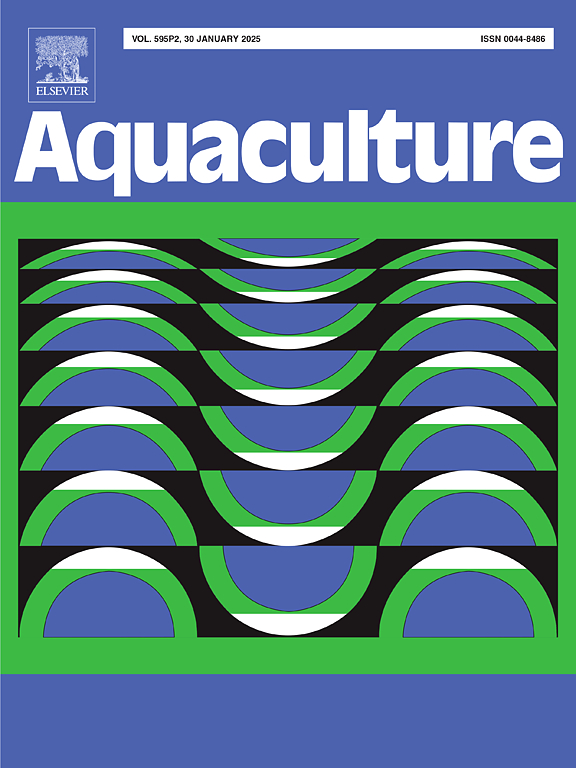Ginseng extract alleviates growth reduction, intestinal barrier damage, and oxidative stress in Lithobates catesbeiana induced by soybean meal
IF 3.9
1区 农林科学
Q1 FISHERIES
引用次数: 0
Abstract
The present study investigated the effects of ginseng extract on growth performance, antioxidant capacity, and intestinal health in bullfrogs fed high soybean meal diets. A total of four iso‑nitrogenous diets (crude protein, 40.00 %) and isolipidic diets (crude lipid, 8.00 %) were formulated and administered over a period of 8 weeks. A basal diet containing 10 % fishmeal (FM), a diet replacing all fishmeal with soybean meal (SBM), SBM supplemented with 0.05 % (GSP1) and 0.10 % (GSP2) ginseng extract. Compared to the SBM diet, the inclusion of dietary GSP2 notably alleviated the decline in growth performance and feed efficiency caused by soybean meal (P < 0.05). The levels of total protein and albumin in the serum of the GSP2 group were significantly increased, while the activities of alanine aminotransferase and aspartate aminotransferase showed a marked decrease (P < 0.05); The GSP2 group exhibited a significant increase in the activities of digestive enzymes, particularly lipase and trypsin, when compared to the SBM group. (P < 0.05). Antioxidant indices within the liver, encompassing catalase, superoxide dismutase, reduced glutathione exhibited significant improvements in both the GSP1 and GSP2 groups (P < 0.05). Diet with ginseng extract supplementation significantly improved intestinal morphology, decreased the gene expression of intestinal pro-inflammatory cytokines (P < 0.05). There was a significant shift in microbial populations, favoring beneficial bacteria such as Akkermansia and Sphinomonas in the GSP groups. In conclusion, the supplementation of ginseng extract effectively mitigates the adverse impacts of high soybean meal diets on bullfrog growth, liver health, and intestinal function, while simultaneously enhancing immune response and antioxidant capacity. Notably, optimal effects were observed at a supplementation level of 0.10 %.
求助全文
约1分钟内获得全文
求助全文
来源期刊

Aquaculture
农林科学-海洋与淡水生物学
CiteScore
8.60
自引率
17.80%
发文量
1246
审稿时长
56 days
期刊介绍:
Aquaculture is an international journal for the exploration, improvement and management of all freshwater and marine food resources. It publishes novel and innovative research of world-wide interest on farming of aquatic organisms, which includes finfish, mollusks, crustaceans and aquatic plants for human consumption. Research on ornamentals is not a focus of the Journal. Aquaculture only publishes papers with a clear relevance to improving aquaculture practices or a potential application.
 求助内容:
求助内容: 应助结果提醒方式:
应助结果提醒方式:


